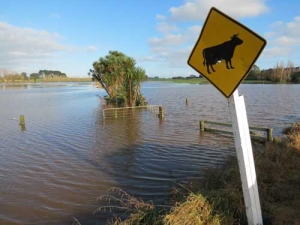About 100 farmers in the Whanganui area are facing production losses this season of up to $100,000 as a result of the recent floods.
That’s the view of Whanganui Federated Farmers provincial president Brian Doughty, a key man in assessing damage and co-ordinating help. Last week he stayed in Whanganui doing this rather than attending the Feds annual conference.
Doughty says in the worst cases up to 25% of the land has been damaged and many hit badly in the 2004 floods have been hit again.
“The loss of production, plus some re-instatement, is a substantial loss for those farmers,” he told Rural News. “If you take the whole Whanganui area it amounts to over $1 million and probably more like $2.5m if you include the Waitotara Valley area.”
Doughty says some farmers want the event declared ‘major’, which would trigger more cash from the Government. But MPI and Minister Nathan Guy say it is a ‘medium scale’ event and that farmers are resilient and will help each other.
“I told the minister ‘that’s true, but farmers holding hands won’t grow any grass’. I left it at that.”
Doughty says from what he’s heard farmers don’t necessarily want a lot of money, but rather to be recognised for their plight.











